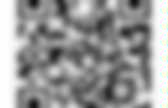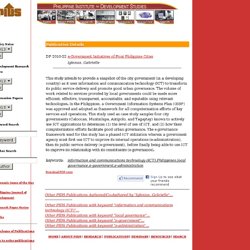

Index. E-Government in Four Philippine Cities. This study intends to provide a snapshot of the city government (in a developing country) as it uses information and communication technology (ICT) to transform its public service delivery and promote good urban governance.

The volume of work related to services provided by local governments could be made more efficient, effective, transparent, accountable, and equitable using relevant technologies. In the Philippines, a Government Information Systems Plan (GISP) was approved and adopted as framework for all computerization efforts of key services and operations. This study used as case study samples four city governments (Caloocan, Muntinlupa, Antipolo, and Tagaytay) known to actively use ICT applications to determine: (1) the level of use of ICT, and (2) how their computerization efforts facilitate good urban governance. ICT for Empowering the Urban Poor. Overview Mobile and mapping applications, SMS texting, and GPS-enabled mobile phones are becoming increasingly popular and have the potential of transforming the lives of the urban poor, many of whom live in slums.

Lack of secure tenure, crime, violence, and absence of basic services are the reality of their lives. “ICT for Development”, or ICT4D, could help address these issues through better information and communication. The majority of ICT applications are linked to mobile phones, with the number of users reaching some 3.9 billion in 2010. Internet use is still well behind with only 21 percent of those in developing countries having access but the connectivity is rapidly improving. Applications in the health and banking sectors through Mobile Health (mHealth) and Mobile Banking (mBanking) are likely the most prevalent uses of mobile applications. mHealth approaches include using SMS to ‘broadcast’ important health information through SMS (e.g. ICT and access to information for urban poor. Information Needs of the Urban Poor.
‘Open information solutions for the Urban Poor’ “Tools such as mobile phones can be used to empower citizens through mapping their communities, providing feedback on service delivery, and gaining access to information on jobs, markets, and hazard conditions.”

Judy Baker, Lead Economist of the World Bank Institute Urban Practice A couple of days ago I had the opportunity to attend a Brown Bag Lunch of the World Bank Institute WBI entitled ‘Open Information Solutions for the Urban Poor’. During an hour and a half four speakers advocated the use of Information and Communications Technologies ICT for development or what they call ICT4D. While, being a user of many ‘Aps’, I was aware of the endless applications that open information solutions had in developed countries – where there is a high access to information technologies – , however, their use in urban contexts in developing countries seemed to me distant and complex.
It took me only an hour to change my mind. Reality check… From Yelp to M-PESA Here are some links: Like this: ICT for Urban Governance - MOD Institute. Urban Governance through ICT. Good Urban Governance through ICT. How can ICTs improve the lives of children and youth living in cities? At the global level, a very small percentage of development funding goes to urban spaces, yet hard-hitting issues impact many of the urban poor: lack of tenure, lack of legality of land, informal settlements, lack of birth registration and civil registration in general, waste disposal, clean water, politicizing of local authorities and more.

Can new technologies be a solution for some of these issues? Tuesday’s Technology Salon NYC offered a space to discuss some of the key challenges and good practice related to working with children, youth, and urban communities and explored the potential role of ICTs in addressing issues related to urban poverty. According to UNICEF, who co-organized and hosted the Salon at their offices, half of the world’s people – including over one billion children – live in cities and towns.
We welcomed 3 experienced and engaging discussants to the Salon, who commented on the intersection of children, youth, urban environments and new technologies: Technology: ICT & poverty alleviation, Uganda.